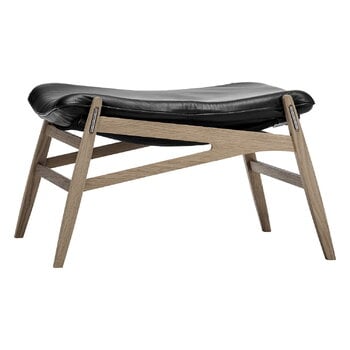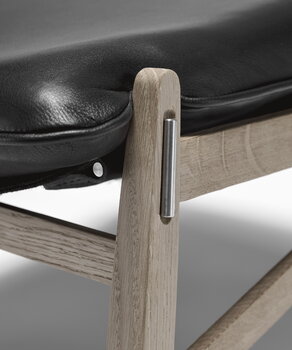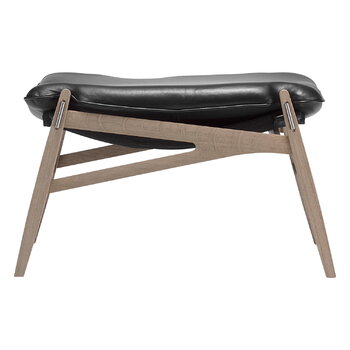Stolab's Link stool boasts a distinctive design that combines the best of both worlds: it is, at the same time, a comfy footstool and an elegant example of contemporary Nordic design. Designer Dan Ihreborn sought inspiration for the stool from 1950s Nordic design and Swedish Stolab's long history in manufacturing wooden furniture but added a touch of innovation and a contemporary edge – the leather-upholstered footstool easily blends into both modern and classic interiors.
Link foot stool, white oiled oak - black Elmotique leather
Stolab
Description
Stolab's Link stool boasts a distinctive design that combines the best of both worlds: it is, at the same time, a comfy footstool and an elegant example of contemporary Nordic design. Designer Dan Ihreborn sought inspiration for the stool from 1950s Nordic design and Swedish Stolab's long history in manufacturing wooden furniture but added a touch of innovation and a contemporary edge – the leather-upholstered footstool easily blends into both modern and classic interiors.
Product details (6)
- Colour
- White oiled oak. black
- Width
- 63 cm
- Depth
- 54 cm
- Height
- 38 cm
- Frame material
- White oiled oak
- Upholstery fabric
- Elmotique 99001 leather
- Product ID
Designer
Dan Ihreborn is a Swedish designer who focuses especially on furniture design and industrial design. In addition to wider industrial production, Ihreborn designs furniture for offices, hotels and other public spaces, among others, and various unique works for his own design project The Dan Ihreborn Private Collection.
View all productsReviews (0)
Sustainability
The Product Sustainability Framework, our criteria of sustainable design, helps you find the most sustainable products in our selection. Read below which sustainability criteria this product has met.
Working conditions & labour 6/9
-
Equal opportunities for all employees
-
Commitment to UN Global Compact, fair compensation for all employees
-
Corporate responsibility requirements defined and communicated for suppliers
-
Systematic work for improved inclusion and well-being in the workplace
-
Transparent supply chain
-
Suppliers' compliance to a code of conduct ensured
-
Direct suppliers audited and certified
-
Compliance to the UN Guiding Principles on Business and Human Rights ensured in the supply chain
-
Support for community involvement in the supply chain
Eco-friendly production 6/9
-
Fair and resource-wise water-use in production
-
No incineration or landfilling of returned items
-
No use of endangered species as materials
-
No direct environmental emissions or waste (excl. GHGs) from production
-
The sustainability of direct suppliers' production is addressed and monitored
-
Production and material sourcing that respect biodiversity, animal rights, and natural ecosystems
-
Material-efficient and ecological packaging
-
Positive impact on nature’s well-being through operations that regenerate natural ecosystems
-
No potentially harmful chemicals used in own production
Climate impact 3/8
-
Company's direct greenhouse gas emissions identified and commitment to reduction
-
Product's carbon impact identified and commitment to reduction
-
Guidance on energy- and eco-efficient use of the product
-
Contribution to climate initiatives beyond the brand’s direct operations
-
Low-carbon or compensated transportation
-
Carbon footprint of the product calculated and goals set to reduce it
-
100 % renewable energy in own production and operations
-
Carbon neutral or carbon negative product
Sustainable materials 5/6
-
Sustainable and long-lasting material choices
-
No harmful or hazardous substances
-
Responsible raw material sourcing and production
-
Materials suited for circularity: monomaterials, recyclable finishings, renewable or recycled contents etc.
-
Ecological materials: natural, biodegradable, recyclable or recycled contents
-
Outstanding materials in terms of innovativeness, responsibility, sustainability and circularity: local production or sourcing, 100 % recycled content, C2C-certification etc.
Circular design 2/5
-
High aesthetic quality promoting long-term use of the product
-
Technically durable product design and material choices
-
Design for enduring life-long quality
-
Design and support for product maintenance, repair and upgradability
-
Innovative circular design solutions: circular service system, resale platform, remanufacturing, collection of used products, etc.











